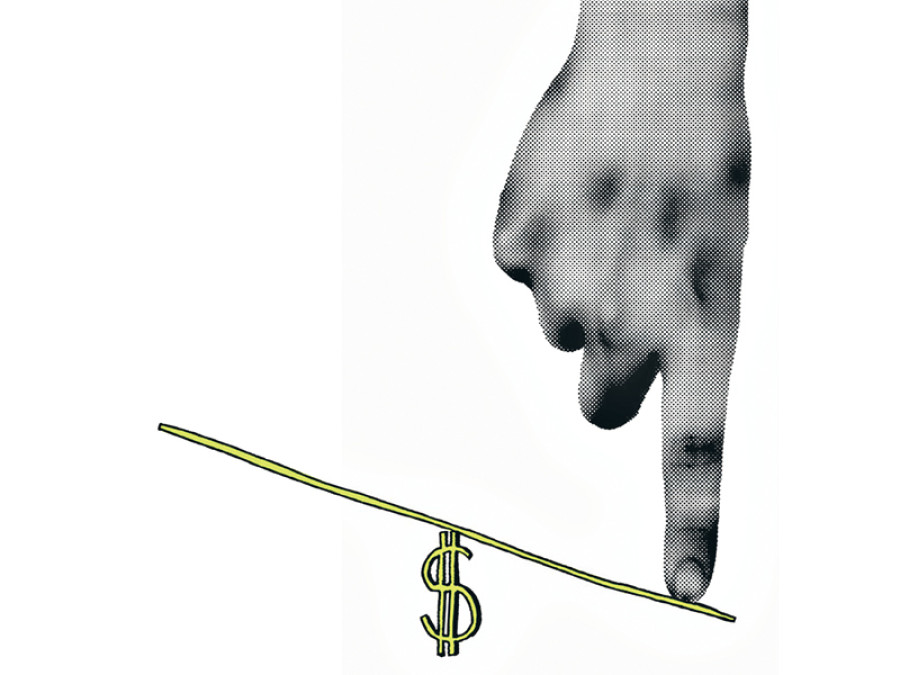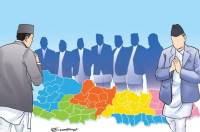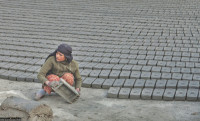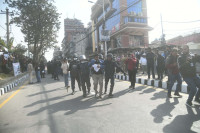Opinion
A harder road ahead
Avoiding irregularities and misuse of funds will be a herculean task for the Reconstruction Authority
The devastating earthquake in April and its subsequent aftershocks killed nearly 9,000 people and injured over 22,000. Not only did they destroy homes and properties, but caused dreadful hardships to millions of survivors. The devastation wrought by the quake brought the major political parties with different interests together to promulgate the long-awaited constitution. The major parties had hoped to end the prolonged political instability by endorsing the statue and then creating an all-party government which would help the state to focus on the post-earthquake reconstruction. However, the political unity was short-lived. After the constitution was promulgated, the parties, which had a post-constitution power arrangement in mind, failed to form the unity government and prioritise reconstruction. Instead, reconstruction started getting politicised from the very beginning.
Politicisation begins
Initially, the government had announced to establish a National Reconstruction Authority (NRA) that would be solely responsible for the post-quake reconstruction and rehabilitation projects. But the Nepali Congress, the then ruling party, and its coalition partner, the CPN-UML, had a power tussle for quite a long time before they could decide on the chief executive officer (CEO) for the Reconstruction Authority. Eventually, almost four months after the quake, the NC-led government appointed Govinda Raj Pokharel as NRA’s CEO, despite reservations from the UML.
But soon after the CEO was appointed, the ordinance which created the NRA was not turned into a bill within one month as required by the law and the body was temporarily dissolved. Then the UML, the second largest party in Parliament, did not endorse the Reconstruction Bill, keeping in mind the party’s possible comeback in the government, which would allow it to choose the CEO of its choice.
Subsequently, the parties disagreed on the larger political deal on the post-constitution power sharing arrangement and the NC was confined to the opposition bench. Despite being in the opposition, the NC adopted all possible measures, including obstruction in Parliament, to continue Pokharel’s position in the NRA. The NC’s bargaining power for the key position, however, became weak as public pressure was mounting on all the parties to expedite the reconstruction process. This compelled it to backtrack from its stance, clearing the way for the Oli-led government to appoint its candidate, Sushil Gyawali, as the CEO.
Gyawali, a civil engineer, was not a very well known figure before taking charge of this high-profile job. Although he has denied his inclination to any political party, getting appointed to such a position by beating dozens of other aspiring candidates would otherwise have been impossible.
All eyes on money
In the aftermath of the quake, it was widely perceived that the political parties would overcome the crisis collectively regardless of their past track records. By settling the prolonged constitution writing process, they demonstrated collective efforts to some extent. Unfortunately, the same spirit for accelerating reconstruction by forming the NRA was sorely lacking.
Given the corrupt history of the political parties in the country, one can easily conclude that the only reason behind the months-long wrangling over the NRA is the money pledged by the donors for the reconstruction projects. International donors have pledged over $4 billion for reconstruction. In addition, the government has allocated about $700 million for the current fiscal year. The parties are eying to use the reconstruction fund to influence politics rather than implement the reconstruction projects in a fair manner.
Several investigations carried out by anti-graft bodies have shown that high-level bureaucrats and politicians including ministers were found involved in misusing relief funds. Former Minister for Urban Development Narayan Khadka and Secretary Arjun Karki were accused of misusing state funds while purchasing tents and tarpaulins. Interestingly, the Commission for the Investigation of Abuse of Authority did not take any action against them but filed corruption cases against junior-level ministry officials. Former Home Minister Bam Dev Gautam, accused of embezzling funds while chartering helicopters for rescue operations and misusing relief materials, was never questioned by the authorities either.
Local woes
The situation is worst at the local level. Local bodies, which are running without elected representatives for more than 13 years now, are at an almost dysfunctional state with the absence of Village Development Committee (VDC) secretaries, the nodal points in local bodies. Out of 3200 VDCs, only about 780 secretaries are currently stationed in their offices. About 2000 secretaries are confined to the district headquarters. Of the 419 vacant VDC secretary positions, 190 lie in quake-hit districts.
Moreover, it has been reported that local politicians largely misused immediate cash relief worth Rs 15000 distributed by the government by colluding with the civil servants and locals. Even the number of quake affected households is not in alignment with the census. For example, in one VDC, the number of quake affected households is 17,000 more than the number registered in the 2011 census. When CDOs from all 14 quake-hit districts were interviewed, they said as many as 100,000 households had increased in the districts. Local politicians have been blamed for adding their supporters to the quake-affected list to pocket government relief.
Even after the appointment of the CEO of the NRA, it is not yet clear how the reconstruction process will move ahead. The differences among the major political parties, highly politicised bureaucrats and absence of VDC secretaries will certainly affect the process. In this context, completing the reconstruction projects while ensuring justice and access to the real quake victims will be a tough job for the NRA. Re-verification of victims could be a solution. But avoiding irregularities and misuse of funds will be a herculean task in a country like Nepal. It is uncertain if the NRA chief could do so in the context of an already delayed reconstruction process and his compulsion to work under political pressure.
Sharma is with the political desk at the Post




 10.12°C Kathmandu
10.12°C Kathmandu









